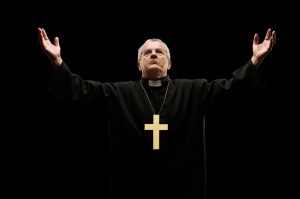Can a Priest Be an Atheist?
 Photo by ljupco / 123RF
Photo by ljupco / 123RF Can one be a priest and an atheist? That’s a question Religion News Service is asking after a survey revealed that two percent of Anglican clergy in England believe that God is a social construct. The survey also found that 16 percent of clergy are unclear about the nature of God.
Despite the growing number of individuals in both the United States and the United Kingdom who identify as non-religious, the survey found that older members of the clergy were more likely to hold unorthodox views about God, rather than their younger counterparts. This finding seems to run contrary to what one might expect. After all, wouldn’t older clergy be more set in their ways than younger ministers? However, Dr. Darren Middleton, professor of religion at Texas Christian University, actually sees this finding as unsurprising: “I suspect that some older clergy are more likely to hold non-traditional beliefs about God because…over the years their ideas have been challenged by arduous situations—ministering to the parents of a child suffering with inoperable cancer, let’s say—where prayer seems problematic and conventional theologies appear outmoded.” Taken from the perspective that older religious leaders have more life experience that may cause them to question traditional church teachings, the survey results seem almost intuitive. Many secular humanists who have turned away from religion should be able to feel some sympathy for questioning clergy who cannot reconcile the church’s beliefs about God with the suffering that they see in daily life.
One individual who does not seem so sympathetic to this struggle is Alison Ruoff, a lay leader of the General Synod, the Church of England’s governing body, who stated in The Independent, “They shouldn’t have been selected…we expect better from [our priests].” Despite these concerns, the Church of England does not sanction clergy who take up nontraditional views or accuse them of heresy. In fact, Middleton suggests that allowing religious leaders to think critically about their beliefs can strengthen the church. “The Church has often benefited from those clergy who are singularly unafraid to doubt,” he said in an email. “I’d like to think, and I certainly hope that people in the pew would appreciate a refreshingly honest priest.”
While the survey results may appear mildly shocking, Middleton does not think that they will shatter the faith of religious adherents. “Two percent does not seem like a number to inspire consternation,” he said. “I’m not surprised by the number, and anyone who has been following ecclesial trends in the UK for the past decade or so should not be surprised either.” While he doesn’t believe that the survey results will significantly affect trust in the church, Middleton does feel that “there is much to commend in ‘religious humanism’” in spite of its controversy within the church. If members of the clergy, in both the UK and the US, felt more comfortable being open about their questions and doubts, their honesty could inspire dialogue between religious humanists and secular humanists, who could find common ground in their shared value of critical thinking.
